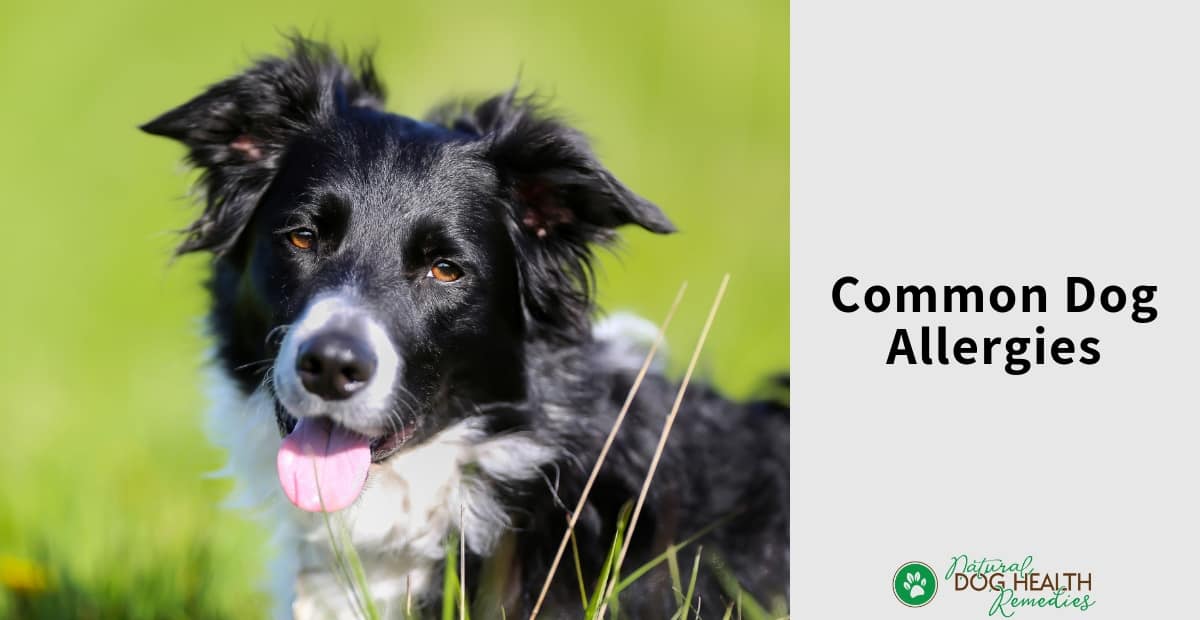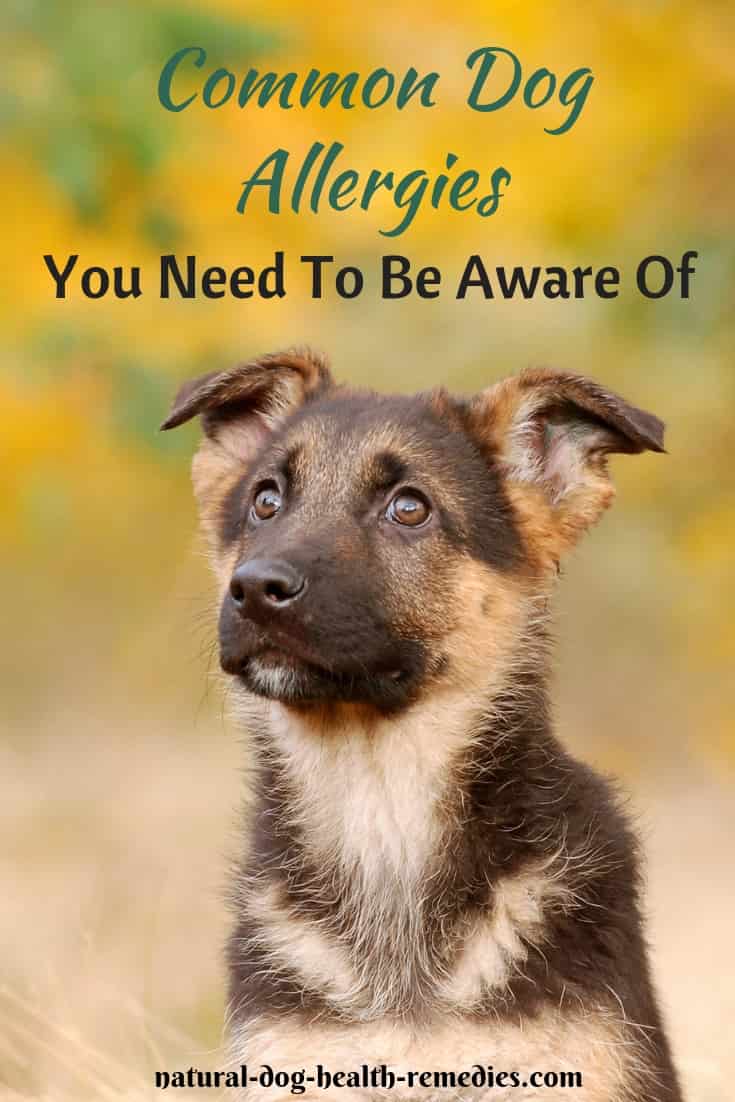Common Dog Allergies

Overview
Is your dog constantly scratching, chewing, and licking? If so, there is a possibility that he may be suffering from some form of allergy.
In recent years, the number of dogs suffering from dog allergies has increased dramatically. At the same time, many dogs have been mis-diagnosed as having allergies when in fact they are suffering from something else.
For example, dogs suffering from hypothyroidism frequently have skin infections which are often mis-diagnosed as canine atopic dermatitis.
Because of the mis-diagnosis, they are being put on the wrong medication (usually corticosteriods) and sometimes suffer from side effects of such medication.
A proper diagnosis is therefore very important before any treatment is given to our dogs.
In this article, you will find information on the following topics:
- How Can You Tell if a Dog Has Allergies?
- Why do some dogs get allergies while others don't?
- What are some common dog allergies?
How Can You Tell if a Dog Has Allergies?
Allergies are basically symptoms manifested as a result of a dog's immune system working hard to get rid of outside substances.
These substances - allergens - can be anything (natural or artificial, organic or inorganic), and they can be found in a lot of places and things, such as food, in our homes, and in the environment.
They can cause allergic reactions after being ingested, inhaled or absorbed.
Usually, canine allergies are manifested in three ways.
- The most common is itching and inflammation of the skin which can either be limited to one area (localized) or all over the body (generalized).
- Another manifestation involves the respiratory system and may result in coughing, sneezing, and/or wheezing. Nasal and/or eye discharge may also be present.
- Finally, sometimes dog allergies involve the digestive system, resulting in vomiting or diarrhea.
Why do Some Dogs Get Allergies While Others Don't?
Allergies in dogs come, first and foremost, from the "inside", rather than from outside allergens.
There are lots of potential allergens in our environment, but not all dogs develop allergies. Those who do are often dogs with problems from the "inside", for example, an already weakened immune system, hormonal imbalance, bacterial or fungal infections, etc.
When exposed to outside allergy-causing factors, (such as fleas, poor quality food, environmental toxins, over vaccination), these dogs are more prone to develop symptoms of allergies.
If your dog shows allergy symptoms, be sure to consult your vet and ask that a thorough check-up (skin and blood tests) be carried out to identify the "inside" cause of the allergy.
Finding out the inside "root" problem and getting rid of that problem will strengthen the overall health of your dog, making her more resistant against the outside allergens.
What are Some Common Dog Allergies?
Common dog allergies include:
- Canine Atopic Dermatitis
 One of the most common dog allergies is canine atopic dermatitis, aka canine atopy.
One of the most common dog allergies is canine atopic dermatitis, aka canine atopy.Canine atopic dermatitis is a genetic inflammatory skin disorder, in which the dog becomes sensitized to environmental allergens (such as pollens, molds, house dust mites, etc.)
Depending on the allergens, canine atopy can be seasonal (e.g. pollen allergies) or it can be year round (e.g. house dust mites, molds, etc.)
Allergies usually occur within 1 to 3 years of a dog being exposed to continual environmental allergens.
(Visit this page for more information.)
- Dog Flea Allergies
Flea allergy dermatitis, aka dog flea allergies, used to be one of the most common dog allergies. However, with more flea control products available to dog parents, the incidence of flea allergies in dogs has decreased substantially.
The cause of flea allergy dermatitis is the saliva of the flea which contains a number of chemicals that can induce an allergic response in dogs.
(Visit Flea Allergies for more information.)
- Dog Food Allergies
Compared to canine atopy and flea dermatitis, true food allergies in dogs are rather rare, accounting for less than 10 percent of cases referred to veterinarians.
Canine food allergies result when a dog develops allergic reactions to one or more ingredients in his food. It causes intense itching to the allergic dog.
Suspect dog food allergies if your dog shows allergy symptoms all year round and does not respond to anti-inflammatory and anti-itching medications such as corticosteroids.
To diagnose dog food allergies, you need to feed your dog an "elimination diet", the purpose of which is to ban all protein that the dog has eaten before in order to isolate and identify the allergen.
(Visit Food Allergies in Dogs for more information.)
- Contact Dermatitis
Contact dermatitis is caused by direct skin contact with an allergen. Contact dermatitis usually causes sudden onset of skin reactions such as itching, hives, rashes, and hair loss.
Common culprits that may cause contact dermatitis in dogs are chemicals found in some flea collars, soaps and disinfectants, weed killer, fertilizers, and insecticides.
If your dog shows symptoms such as hair loss, redness, and/or inflammation around the neck shortly after beginning to wear a flea collar, chances are she is allergic to the collar.
Soaps and gardening chemicals can cause allergic reactions on the skin that can easily contact the ground, such as the "armpits", and the stomach and groin areas.
Sometimes, the dog may also develop mouth lesions if she licks the affected areas.
Beware of Acute Allergic Reaction
Although rather rarely, a dog could develop an acute allergic reaction to things such as bee stings, insect bites, and vaccines.
If the reaction is severe (a case of anaphylaxis), the dog shows symptoms such as:
- Facial swelling
- Hives
- Breathing difficulties
- Weakness
- Collapse
Understandably, this is serious and can be fatal if left untreated.
If you notice any of these allergic reactions in your dog, don't waste any time. Take him to the vet or an emergency vet clinic immediately, because the severity of the symptoms may worsen very quickly.

Treating Dog Allergies Holistically
For non-emergency cases of dog allergies, it is often more effective to treat the symptoms holistically. Check out some natural home remedies that can relieve allergy symptoms in dogs. For other treatment options, visit this page.
ReferencesEldredge, et al. Dog Owner's Home Veterinary Handbook 4th edition (Wiley Publishing, 2007).
C.J. Puotinen, Natural Remedies for Dogs and Cats (Keats Publishing, 1999).
M. Goldstein, The Nature of Animal Healing (Ballantine Books, 2000).
S. Messonnier, The Allergy Solution for Dogs (Three Rivers Press, 2000).





